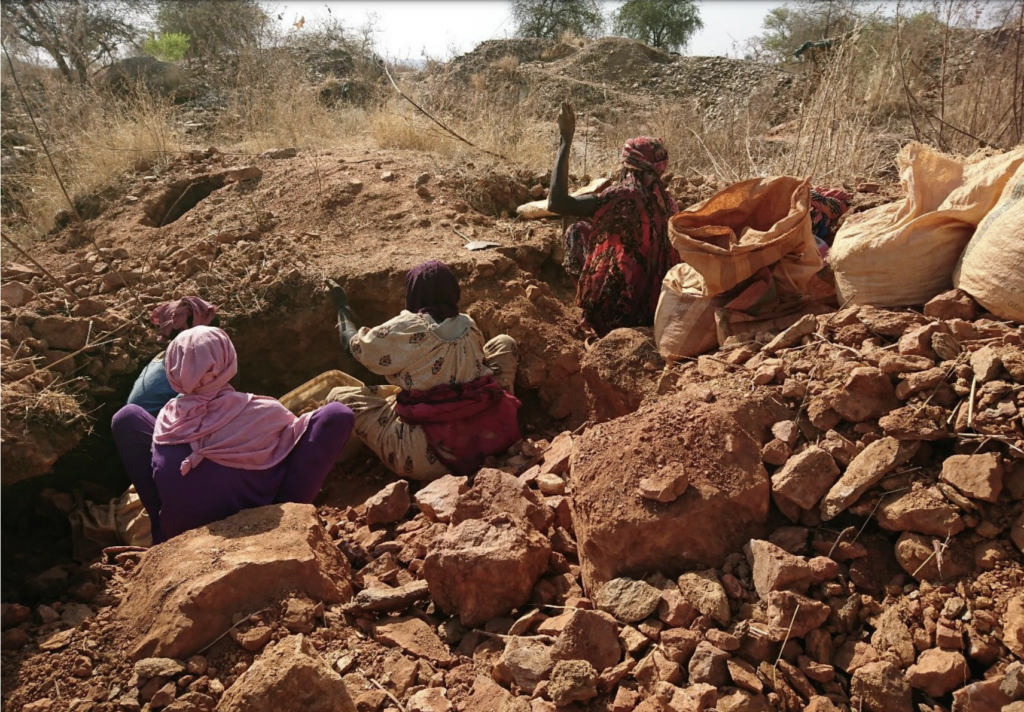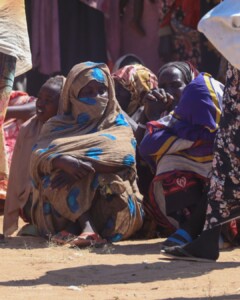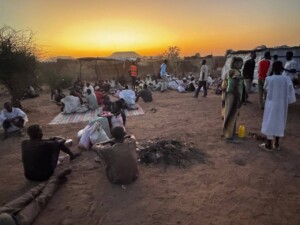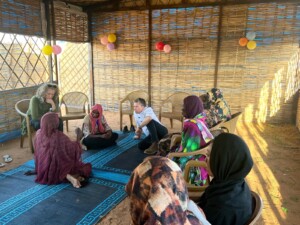South Kordofan orders removal of illegal gold mining mixers

Women working in gold mines, close to Belguwa market in in Sudan's Blue Nile state (Image: Rift Valley Institute)
Maj Gen Abdelaziz Ibrahim, Commander of the 10th Infantry Division in Abu Jubeiha, South Kordofan, has launched a campaign to remove illegal mixers used in gold mining. These mixers, which employ harmful cyanide to extract gold, are a significant environmental and health hazard.
The directive followed a meeting on Tuesday between Maj Gen Ibrahim and a delegation from the Sudanese Mineral Resources Company, led by Saeed Mohamed. The Sudanese Mineral Resources Company noted that the use of illegal mixers had “significantly expanded” in the eastern localities of South Kordofan, in a statement after the meeting.
The meeting also addressed the implementation of Resolution 16, which involves increasing fees for mobile mining operations, according to the statement. The officials agreed on the “urgent need to remove these mixers from mining markets in the state’s eastern regions”.
In addition to the mixer removal campaign, Maj Gen Ibrahim has instructed the Sudanese Mineral Resources Company to open an office in Abu Jubeiha, and directed that reports be filed against the owners of the illegal mixers.
An activist, speaking anonymously for security reasons, described the outcomes of the Abu Jubaiha meeting as “promising”, but was concerned about the actual implementation: “A similar order to remove the mixers, issued on January 2, 2024, has not yet been enforced, due to a lack of will from the authorities to do so.”
The activist also highlighted concerns that the increase in fees for mobile stone mining might be influenced by vested interests within the local administration, “who benefit from the current mining activities”.
Toxic waste
Environmental activists have expressed alarm over the proliferation of gold extraction mixers in eastern South Kordofan. According to Radio Dabanga, there are currently over 232 mixers in Talodi locality alone. An additional 25 mixers are scattered throughout the eastern localities.
Mixers are used in goldmines to chemically process gold ore and separate the precious metal from other mineral deposits, such as rocks and sand. Toxic metals such as cyanide and mercury are frequently used in these processes and pose a big risk to the environment if not processed, treated, or stored correctly.
Mining waste dumps from these mixers (called karta in Sudan), containing heavy metals such as admium, lead, zinc, copper, arsenic, selenium, and mercury or cyanide, form a long-term hazard second only to nuclear waste dumps.
In March 2023, shortly before the outbreak of war in Sudan, the Sudanese Mineral Resources Company said it seized gold mining sites with ‘unregulated’ mixers in Talodi, following a report on the mysterious death of a number of livestock. Activists in the area said however that the company actually ratified the mixers and periodically collected fees from their owners.
Sudan is reportedly the second-largest producer of gold in Africa and the ninth in the world. Gold mines are scattered across Sudan, including Darfur, South Kordofan, and Blue Nile. Artisanal mining has also drawn hundreds of thousands of gold seekers to the deserts of Sudan’s northern and eastern states.
Despite the ongoing war between the Sudanese Armed Forces (SAF) and the paramilitary Rapid Support Forces (RSF), gold exports have surged in the first quarter of 2024, generating revenue exceeding $428 million for the Central Bank of Sudan (CBoS).











 and then
and then